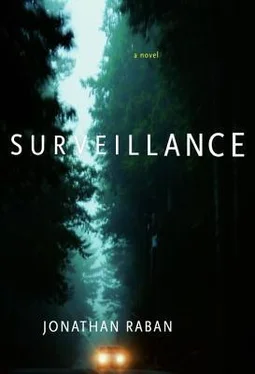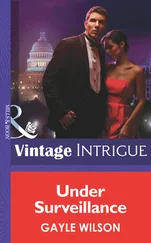The thought crossed Lucy’s mind that this smoking business was a bad-boy act staged expressly for her benefit. Beyond the labyrinth of drying sand flats, the sea was turning copper in the late afternoon sun. “Would it be okay to ask what you’re working on now?”
“You may not like the answer. It’s a salvo in the war you don’t believe in. Wearing my last remaining academic hat, as an adjunct fellow in international affairs at the Council on Foreign Relations, I’m doing something for them about how to combat anti-Americanism abroad, especially in the Muslim world.”
“Sounds like you have your work cut out for you.”
“I don’t want to seem a lard ass, Lucy, but I love this country, and it breaks my heart to see it turned into the most hated nation on earth.”
“I’ll drink to that.”
“We share a premise!”
“Oh, I think we share quite a few.”
Gusting smoke, Augie said, “The way I see it, every poor sap living under a dictatorship, when he dreams of being free he dreams of being an American. Most probably he doesn’t even know that himself. But it’s our freedoms he’s dreaming of, and in his heart of hearts he wants to be here on this patio, drinking martinis, talking like we’re talking now. He wants his press to be like our press, his elections to be like our elections. He wants our movies, our TV, our music, our automobiles, our standard of living. Syrian, Egyptian, Saudi, Indonesian — doesn’t matter what his nationality is — he dreams of being us, and if we can only waken him to that knowledge we can roll back this terrible tide of anti-Americanism that’s sweeping around the world.
“We got to invest, and invest big, in secular education in countries like Saudi Arabia and Pakistan. We need a whole lot more scholarship programs in this country. But most of all, we got to open that guy’s eyes to what he’s really feeling. I’d like to believe that inside every would-be jihadi in a madrasa there’s a frustrated democrat trying to get out — and our job is to liberate that weak, uncertain little voice inside of him that talks of freedom and show it for what it is.”
So that was what the morning clatter of the typewriter was all about. “A pity we don’t set a better example, isn’t it?”
“What do you mean?” He was burying his cigarette stub deep in the watered earth of a potted hibiscus.
“I mean we go yakking on about human rights, then we torture them in their own jails. We talk up freedom of the press, then close their papers down, or bribe them to print feel-good stories about us, written by us. If I were your poor sap living under a dictatorship, I think I’d more likely see America as a hypocritical tyranny than as the land of the free.”
“Oh, abuses happen. Just because you’re a democracy doesn’t mean you’re perfect. Some commander in the field makes a wrong call. A department head in Langley, Virginia, okays something that he shouldn’t. Of course it happens. But because we’re a democracy we get to hear about it, and that’s the difference. If you read The New York Times —not my favorite paper — you’d think that’s all that ever happens, abuse after abuse after abuse, and that’s part of democracy, too. Sure we make mistakes, but we make them in public, and correct them in public. Trouble is, with an open society like ours, outsiders looking in think, Hell, if they’re putting all this bad stuff in the papers, what else is going on that doesn’t make it onto the news? What they don’t understand about America is that what you see is pretty much what you get, and that in their countries The New York Times would have been closed down long ago for sedition and treason.”
“So what is your favorite newspaper?”
“I think The Wall Street Journal has pretty balanced coverage on the whole. But I wouldn’t want to lay a finger on The New York Times , any more than I’d want to lay a finger on Fox News. It’s the spectrum I care about, liberal and conservative — I want the whole nine yards. Don’t get me wrong. I’m a First Amendment nut, and I’ve lived under a regime where the only newspaper was called Truth. Sometimes, when I hear liberals talk, I have a dream: I’d like the ghost of Stalin to come back and rule the U.S. for, let’s say, three days, and after that we’d pick up the conversation where it had left off. Boy, you’d see those guys change their tune. ‘Tyranny,’ you say. Lucy, I can tell you in all sincerity that you don’t have the faintest inkling of what tyranny is.”
He was the host, she the guest. She twirled her martini glass around and around between fingers and thumbs. To the receding sea in the far distance she said, “You’re right, of course. I don’t. But I still find it very hard to stomach a lot of what my country is doing in the world right now.”
“I know. It’s partly a matter of age, I think. I envy you being still young enough to be so intolerant of imperfection. Me, I’ve hit that stage of geezerdom when you recognize that everybody and everything has its flaws. Deep flaws. I think of Thomas Jefferson. ‘All men are created equal and independent’—when he wrote that, if he looked down from his window up there at Monticello, he’d’ve seen his own slaves working out in the fields. Hypocrisy? And what about Sally Hemings? Or how viciously he trashed his rivals, like Hamilton and Burr, with lies and spin? He was a master of the dirty-tricks campaign, could’ve taught the Watergate burglars or Lee Atwater a thing or two. It’s only by a whisker that Jefferson comes out on the side of the angels, and he’s still my great American hero. He’s huge. You’ve read Montaigne?”
“No.”
“Good. He’s a writer best discovered when you’re old. Give yourself his essays on your sixty-fifth birthday, or your seventieth, and you’ll see what I mean. Anyway, Montaigne said that there is no man so good that if he placed all his thoughts and actions under the scrutiny of the laws he wouldn’t deserve hanging ten times over. Jefferson — even Jefferson — deserved to hang. Every president we’ve ever had deserved to hang.”
“Some more than others.”
“True, but when you judge this president, remember Jefferson. I believe this war we’re fighting is a just war, a necessary war, but just like in every other war we’ve made mistakes, some of ’em terrible ones. We’re only human. The president’s only human. Even on the most exalted throne in the world, we’re only sitting on our own bottom.”
“Montaigne again?”
“You got it.”
“But your war still seems so disproportionate to me. I mean, America against who, exactly? All I see is a bunch of mad criminals who obviously ought to be in jail for life without parole — and heaven knows we’ve lived with criminals long enough without trying to fight a world war against them.”
“Yeah, well, in 1941 you’d have been with Lindbergh, a fascist fellow traveler. Millions were. It was Lindbergh who sneered at FDR for trying to spread freedom and democracy by force of arms throughout the world. Sound familiar? Most everything I read in The New York Times these days sounds a helluva lot like goddamn Lucky Lindy. That’s something else that’s wrong with liberals — they’ve lost their memories.”
“You think Roosevelt would’ve backed the war on terror?” She meant it as a sarcasm, but Augie took it as a straight question.
“Sure he would. No doubt about it. We’re fighting the vilest movement on the face of the planet and the greatest threat to western civilization since the Nazis and the Soviets. They’re not ‘criminals’—they’re soldiers in an international army without a uniform, and they’re uniquely dangerous. I’ll tell you what Roosevelt would’ve said — exactly what he did say in a Fireside Chat in ’42…” He peered at the sky, apparently searching for inspiration, then shrugged and began to recite. “‘Those Americans who believed that we could live under the illusion of isolationism wanted the American eagle to imitate the tactics of the ostrich. Now, many of those same people, afraid that we may be sticking our necks out, want our national bird to be turned into a turtle. But we prefer to retain the eagle as it is — flying high and striking hard.’ Sorry about the eagle: there’s usually one up there, but we seem to be out of luck tonight. Care for another martini, or shall we go on to wine?”
Читать дальше












